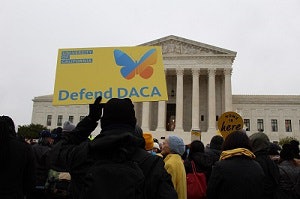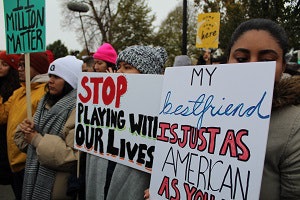The Supreme Court on Thursday blocked the Trump administration’s attempt to end the Deferred Action for Childhood Arrivals (DACA) program, which protects undocumented immigrants brought to the United States as children from being deported.
The decision – determined by a 5-4 vote – came as a relief for the Obama-era program’s 650,000+ recipients, who have been in limbo since President Donald J. Trump discontinued the program in September 2017.
The Supreme Court concluded that the president has the power to rescind DACA, but the administration failed to consider “conspicuous issues,” including “what if anything to do about the hardship to DACA recipients,” Chief Justice John G. Roberts Jr. wrote, which “raises doubts about whether the agency appreciated the scope of its discretion or exercised that discretion in a reasonable manner.”
This means DACA recipients can continue to live and work in the country legally. It’s news that spurred celebration across the higher education sector, which is home to more than 450,000 undocumented students, 216,000 of whom are eligible for DACA, according to a report in April. Many university leaders came out with statements of support.
“The Supreme Court’s decision is a critical victory for DACA students as well as our country’s ideals and best interests,” wrote Peter McPherson, president of the Association of Public and Land-grant Universities. “At a time when our nation and the world are experiencing extraordinary challenges, today’s ruling provides a much-needed ray of light. For the past few years, DACA enrollees have lived in fear that their days with protected status are numbered.”
Dr. Gary Orfield, feeling “tremendously relieved,” praised what he called “guerrilla lawyer-ing” on the part of DACA advocates. Orfield is the co-director of the Civil Rights Project and a professor of education, law, political science and urban planning at the University of California Los Angeles.
DACA could have ended this week had the administration laid out a clear rationale and a detailed plan for its removal, Orfield said, but in its haste, the Trump administration “opened the doors for the defenders of the DACA program to win this case. The weakness and incompetence of the administration have been a gift to minority rights. They blew it so badly they lost in a conservative court.”
The decision took Trinity Washington University president Patricia McGuire by surprise.
At her institution, DACA students make up 10% of the student body, and as the Supreme Court deliberated these past months, McGuire watched her students field both the COVID-19 pandemic and the uncertainty of the pending decision. She prepared for the program’s potential demise. If DACA ended, the university was ready to offer extra counseling and emergency funding for DACA students who would have lost their work permits and driver’s licenses.
“I was very fearful” and “dreading the day the Supreme Court decision would come out,” she said. “We are absolutely thrilled and joyful in ways that are even hard to express.” She described DACA students as “the pride of this country” and “fantastic students, wonderful scholars and student leaders” who “deserve every support.”
But even with this victory, McGuire thinks the work of ensuring security and opportunity for DACA students is far from over. The “demonization” of immigrants “based on what pieces of paper they have” continues, she said. And many DACA students who live in mixed-status households still worry their undocumented families will be deported.
The decision doesn’t protect DACA status forever either, Orfield noted. It saves the program from this particular attempt to dismantle it, but he predicts DACA going “down the drain” if Trump is re-elected.
Meanwhile, the day-to-day stresses of being a DACA recipient continue without a permanent resolution, pointed out Fernando Urbina, a first-generation rising junior at Harvard University and partnerships director for Immigrants Like Us, a Harvard-based nonprofit that creates guides to DACA renewal and helps people renew their DACA status for free online. While excited by the decision, his work will continue.
“I jumped up out of my seat when I saw the decision released,” Urbina said. “This is a huge victory for sure. It’s definitely an important moment in history. But there still remains a lot of uncertainty. They have to keep renewing their DACA status every two years. What’s really needed moving forward is a clear path to citizenship.”
According to Orfield, that’s a move long overdue by Congress, given the widespread sympathy for DACA recipients in public opinion polls.
“This should be one of the easiest civil rights issues in the country,” Orfield said. “These are really wonderful young people … who have grown up as Americans and are Americans and are exactly the kind of people we need in our country. It should be an easy decision.”
The Supreme Court ruling was “an important battle,” he added. “But it’s a much larger war.”
Sara Weissman can be reached at [email protected].















